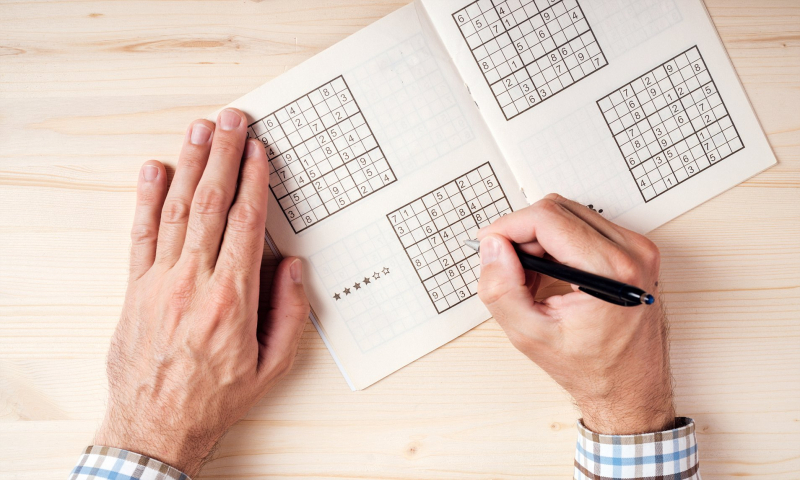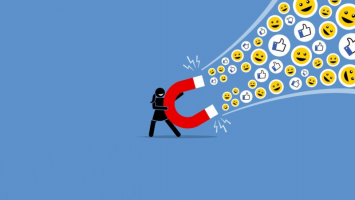Top 15 Tips to Improve Your Concentration
If you've ever struggled to finish a demanding assignment at work, study for a significant test, or put in the time needed on a challenging project, you may ... read more...have wished you had more focus. Then continue reading to find out some of the effective tips to improve your concentration!
-
Certain game types might help you improve your ability to concentrate. Spending 15 minutes a day, five days a week, on brain training exercises may help with focus, according to a 2015 study of 4,715 adults. Additionally, playing brain-training games can improve your processing speed, short-term memory, and problem-solving skills.
You can try some games including sudoku, crossword puzzles, chess, jigsaw puzzles, word searches or scrambles, memory games,... Children's brain training is also effective. Buy a book of word puzzles, complete a jigsaw puzzle together, or play a game of memory. Even coloring can help kids or adults focus better. Adult coloring books sometimes have more detailed coloring pages that older kids might like.

Train your brain 
Train your brain -
There may be other types of games besides brain games that might improve concentration. Additionally, a more recent study shows that playing video games may improve concentration.
There is evidence that one hour of gaming might help improve visual selective attention (VSA), according to one 2018 research involving 29 people. VSA is the capacity to focus while ignoring distractions in a particular job. A 2017 review examined 100 studies that investigated the potential impact of video games on cognitive function. The finding suggests that playing video games may cause a variety of brain changes, including an increase in attention and attention. These conclusions are supported by studies on the benefits of video games.

Get your game on 
Get your game on -
Lack of sleep may easily impair memory, attention, and other cognitive processes, including concentration. Sometimes not getting enough sleep might not be that bad for you. However, consistently not getting enough sleep might impact your mood and productivity at work.
Exhaustion can even impair reflexes and impair your ability to drive or do other daily tasks. It might be difficult to get enough sleep due to a busy schedule, health concerns, and other circumstances. However, it's crucial to make an effort to try and get as close to the recommended amount as possible on most nights. Adults should try to get 7 to 8 hours of sleep every night, according to numerous experts. Being consistent reinforces your body's sleep-wake cycle by going to bed and getting up at the same time every day, including weekends.

Improve sleep 
Improve sleep -
One of the numerous advantages of regular exercise is improved concentration. Everybody gains from exercise. A 2018 research of 116 fifth-graders found evidence that, after just 4 weeks, daily physical activity might significantly boost both attention and concentration.
According to a study of older adults, a year of moderate aerobic exercise can prevent or even reverse memory loss caused by aging-related brain atrophy. Although aerobic exercise is recommended by experts, making any effort is better than doing nothing at all. You could want to exercise more or less depending on your own fitness and weight goals. Try to come up with enjoyable ways to fit exercise into your day if you struggle to find the time or don't want to join a gym. If you get your heart rate up, you’re exercising.

Make time for exercise 
Make time for exercise -
Try to spend time outside every day, even for a short while, if you want to improve your concentration naturally. Think about taking a quick stroll around a park. Sitting in your garden or lawn may also be beneficial. Any natural environment has benefits.
The American Psychological Association (APA) believes that spending time outdoors can benefit one's physical and mental health. According to 2014 research, having plants around the office may improve air quality, boost productivity, and improve workplace satisfaction. For a variety of positive benefits, consider adding a few plants to your house or office. The study also suggests that natural environments could benefit brain development and may improve attention in children.

Spend time in nature 
Spend time in nature -
The benefits of mindfulness and meditation are numerous. One of these is improved concentration. According to a 2011 review of 23 research, mindfulness training that focuses on attention focus may be able to improve concentration and focus.
Meditation is the habitual process of training your mind to focus and redirect your thoughts. Memory and other cognitive skills can be enhanced through mindfulness. For example, one study showed that people who regularly practiced meditation performed better on a visual task and had a greater attention span than those without any meditation experience. Even meditating for a short period each day may benefit you. Meditation doesn’t just mean sitting silently with your eyes closed. Numerous exercises, like yoga and deep breathing, can help with meditation.

Give meditation a try 
Give meditation a try -
A break from your job or schoolwork may help increase your concentration. Although it may seem illogical, experts claim that this idea actually works.
Imagine you've been working on the same project for a few hours when all of a sudden, your focus wanders. You force yourself to stay at your desk even if it's difficult to stay focused on the work at hand. But your inability to focus just increases your stress and anxiety that you won't finish your assignment in time. Next time, when you first notice your focus waning, take a little mental break. Take a little stroll, get some sun, or refresh with a cold beverage or healthy food. Don't be surprised if you feel more motivated, focused, or even creative when you go back to work. Breaks can help boost these functions and more.

Take a break 
Take a break -
Listening to music while working or studying may help increase concentration, but this will depend on the individual. Even if you don't like music, using white noise or natural sounds to block out background noise as you work may help you focus and do other cognitive tasks better, according to a study.
Music has also a positive effect on your ability to memorize. One experiment required individuals to read short lists of words and then recall them. Those who worked with white noise or in silence did worse than those who listened to classical music. A similar effect was shown when the same research tracked how fast people could perform simple processing tasks — matching numbers to geometrical shapes. People were able to finish the activity more quickly and precisely because of Mozart.

Listen to music 
Listen to music -
The foods you eat can have an impact on cognitive functions including memory and concentration. Avoid processed foods, excessive amounts of sugar, and excessively greasy or fatty foods to improve focus. Try consuming more of the following foods instead: fatty fish (think salmon and trout), eggs (white and yolk both), blueberries, spinach,...
The ability to concentrate might benefit from keeping hydrated. Concentration and memory can both suffer from even mild dehydration. By sharpening your concentration first thing in the morning, breakfast can help. Aim for a meal that is high in protein and fiber and low in added sugars. Healthy breakfast options include whole-grain bread with eggs, a plain yogurt with fruit, and oatmeal.

Vary your diet 
Vary your diet -
Caffeine is not required in your diet if you want to avoid it, but studies do show that it may improve focus and attention. Consider drinking some coffee or green tea if you feel your level of focus starting to decrease.
By increasing the release of dopamine and other neurotransmitters and preventing the absorption of adenosine, which causes sleep, caffeine awakens the central nervous system. If you don't drink coffee or tea, a portion of dark chocolate with at least 70% cacao can provide similar advantages. Phytochemicals found naturally in matcha, a type of green tea, have been shown in a 2017 study to not only boost cognitive function but also help relaxation. So if coffee makes you anxious or on edge, matcha can be a good alternative.

Drink caffeine 
Drink caffeine -
Supplements that are supposed to improve health overwhelm store shelves. Some supplements may support concentration and improve cognitive performance. You can try to take the following supplements to get the benefits such as Bacopa Monnier (Brahmi), choline, omega-3 fatty acids, creatine, Gingko Biloba, ginseng, Rhodiola Rosea, tyrosine, valerian root,...
The effectiveness and safety of these supplements for everyone, however, cannot be determined from the available data. In addition, dietary supplements are not governed by the Food and Drug Administration (FDA). If you have any health issues or allergies, you should always see a doctor before trying any supplements. A doctor can evaluate the potential advantages and disadvantages of supplements with you and might suggest the one that is most suitable for your needs.

Try supplements 
Try supplements -
Children that have problems focusing benefit greatly from concentration exercises. This mental exercise is focusing entirely on a task for a set period of time.
Try these things:
- Draw or doodle for 15 minutes.
- Spend a few minutes tossing a balloon or small ball with another person.
- Set a timer for 3 to 5 minutes. Limit your blinking as much as you can.
Suck on a lollipop or hard candy until it’s gone — resist the urge to bite into it. Pay attention to the taste, how the candy feels on your tongue, and how long it takes you to finish it.
Ask your child to write a brief summary or draw a picture of how they felt after doing one of the exercises. Young children can express their emotions verbally. Talking about where they lost concentration and how they managed to refocus can help them develop these skills for use in daily tasks. Adults may also benefit from a focus exercise, so feel free to try it out for yourself.

Do a concentration workout 
Do a concentration workout -
It is becoming common to multitask in daily life. You may not even realize you are doing it, but if you’re picking up kids from school while chatting on the phone and figuring out when to make an appointment is multitasking.
Although it sounds like a wonderful strategy to do a lot, some scientists have questioned this. You may not be as good at multitasking as you would like to believe, according to studies. One reason is that the brain is not designed for handling many tasks at once. What you are actually doing is switching from one task to another. Therefore, you are unable to focus fully on any of those tasks as a result. You could find that you can focus better on each task if you have the chance to concentrate on one at a time.

Avoid multitasking 
Avoid multitasking -
Setting aside time for particular tasks will help you concentrate on one thing at a time and minimize the risk of external distractions. Because you are aware of the time limits, setting time limits can also help you focus your energy on the work at hand.
Make a time period on your calendar to complete your to-do list, and stick to it. Timeboxing has the benefits for you such as making sure you complete tasks, signaling to others when a meeting time is convenient for you and separating work from home life. Or you can try using a timer to work for 25 minutes, then take a 5-minute break. This way, you can focus fully on a task for the allotted time and do something else in the breaks. Using time-control apps to set a phone-free goal is another good option.
Set a timer 
Set a timer -
If you can, make a quiet, designated space for work. Desk organizers, noise-canceling headphones, an adjustable monitor, and adjustable lighting can benefit those who are unable to have a well-appointed office. Make your space as ergonomic and comfortable as you can, keep clutter out of sight, and try to maintain it clean and well-ventilated.
Social media and other apps should be closed, alerts should be turned off, and your phone should be kept out of sight in a bag or backpack. As described in HBR, researchers found that having the phone out of sight—as instead of simply being switched off—significantly improved cognitive performance. Your main priority is to finish the tasks at hand. By creating space for work, you may improve your ability to concentrate by turning off both internal and external distractions.
Create space for work 
Create space for work




































